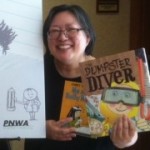Janet Wong worked as an attorney for Universal Studios in Hollywood negotiating labor contracts and firing people. But she felt like she was becoming a mean person. “What was most unsettling to me was that it wasn’t bothering me anymore,” she says. Wong decided it was time to do something more meaningful with her life–perhaps working with children.
However, teaching was not her calling. While attending Yale Law School, she earned some extra money as a substitute teacher. “I was not a good teacher,” says Wong. “It was the hardest job I ever had.” But she liked being around the kids and even volunteered for children’s organizations while working as a lawyer. When she walked into a bookstore to buy a gift for her two-year old cousin, she walked out with an armload of books for herself. “Somebody had to write all these books,” she’d said. “Why couldn’t I be one of them?”
Wong’s legal training prepared her well for the mechanics of writing for children—the multiple drafts, agonizing over the littlest details, and looking at arguments from both sides. Even so, it took a stack of rejection letters for her to admit that writing for children required special skills. She enrolled in a UCLA Extension class taught by children’s poet Myra Cohn Livingston to study rhyme, rhythm and poetic techniques. Wong wrote and read poetry 40 hours per week. The class not only helped hone her skills, it changed her life.
Wong shifted her focus from picture books to poetry, and is now a critically acclaimed children’s poet. To this day, “Waiting at the Railroad Café” (from Good Luck Gold, McElderry Books, 1994) is Wong’s favorite poem because it was her first to receive even the tiniest bit of praise from Livingston, an exacting teacher. “Good Luck Gold is my favorite poetry collection, not because the poems are the best, but because I took the greatest risks,” says Wong. “I wrote about race discrimination, teasing, and death. I’m proud I pushed myself to write about those things.”
Many of Wong’s poems begin with a fact, a feeling, or a situation from her life. “Waiting at the Railroad Café” is true—the waitresses at the café refused to wait on her and her father because they were Chinese. Buzz (Harcourt, 2000) is a reflection of her family’s morning routine. And even though Wong did not give the main character in the story a name, he is based on her son. Other poems and stories may begin with an autobiographical tidbit, but take on lives of their own as the idea develops.
Minn and Jake (Farrar, Straus & Giroux, 2003) started with Wong’s childhood experience of moving from the concrete jungle of Los Angeles to the comparative countryside of San Anselmo. She’d never before seen a lizard, or any wild thing for that matter. Her life changed from a prescribed set of activities to a lizard-catching-go-anywhere-you-want-in-the-afternoon-on-your-own kind of childhood. While Jake mirrors the essence of Wong’s experience, the story is about becoming friends with someone you never expected to call friend.
Wong writes her picture books and poems from her Medina, Washington home. Her writing schedule is sporadic, subject to the demands of school visits and her eleven-year-old son’s extracurricular activities. Wong has learned to treasure these interruptions. Her son’s competitive chess playing has not only changed their lives, it was the inspiration for an upcoming book, Alex and the Wednesday Chess Club (McElderry, Fall 2004).
During day-long school visits and writing workshops for children, Wong writes about ten poems while demonstrating poetic techniques. At the same time, she hones her own skills and gives herself a form of enforced practice. Early on she toyed with the idea of assembling her workshop poetry into a collection, but has decided that any attempt to collect the poems for publication “would diminish the exercise quality of them.”
School visits also allow Wong to stay in touch with her readers—their language, their habits, their emotions, their reactions. Through her workshops and in the following poem, she encourages them to find their inner poet:
There Is a Place
There is a place
where the museum houses thousands of paintings
seen nowhere else in the world,
the colors so bright they grab your eyes
and hold you there, looking,
where the library is filled with brand new books
waiting for you to open them first,
to tell stories only you could know,
where fresh cherries have no pits,
where puppies never grow old.
There is such a place,
hidden deep
in me.
“There is a Place” from Night Garden: Poems from the World of Dreams by Janst S. Wong. Copyright (c ) 2000 by Janet S. Wong. Reprinted with permission of Margaret K. McElderry Books, an imprint of Simon & Schuster Children’s Publishing Division. All rights reserved.


